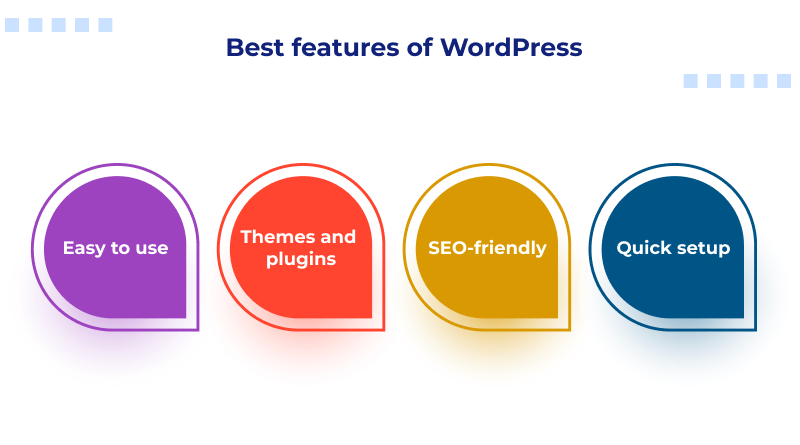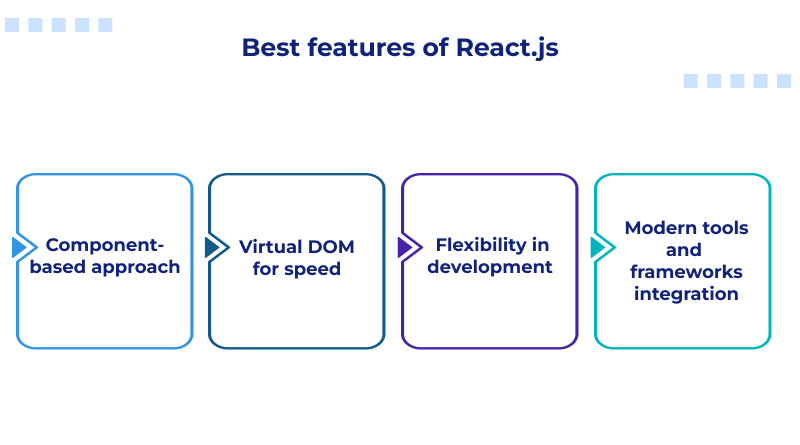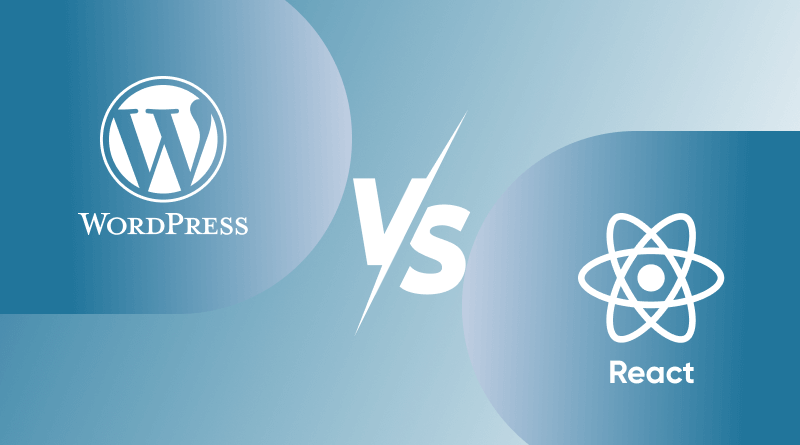Web development, simple-complex apps, user-accessible-interactive experiences, and much more… These are the topics that web developers have to face whenever they had to deal with applications/website development.
WordPress vs. React: Both are powerful tools for web development, each with its own strengths and weaknesses. Hence, when faced with the decision of which approach to choose for a specific project, it can be challenging to determine the most suitable option.
WordPress, the most popular content management system, controls nearly half of the global website market. At the same time, the increasing use of mobile phones makes Facebook’s React, a JavaScript extension library, more popular for its advanced and usable web mobile apps. These two systems form a synergy where React fills the gaps for areas where WordPress lacks and vice versa, giving users functional and performance-based websites that are efficient, easy, and simple to use.
Thus, in today’s world, the question has shifted from “How can I create an e-commerce website?” to “What type of HTML website do I need?” After all, WordPress has always provided basic website-building tool options to users outside the realm of IT, allowing users to build a website professionally without the skill set needed. On the flip side, React serves as an opportunity for developers to use the modern-day JavaScript language to develop non-standard and easily adjustable applicators.
Now comes the most important question: How will you choose the right platform (WordPress vs. React website) that suits your requirement? Worry not; this is exactly what this blog will discuss. It does not matter if you are a small business hosting owner seeking an affordable and efficient alternative or a developer who wants a complex web application built; you need to know the pros and cons of WordPress and React.
We have done a firsthand evaluation and interpretation of the two platforms to ascertain the factors of ease of use, performance, SEO, cost, and, most importantly, WordPress and React customization.
Table Of Content
What is WordPress?
Among React vs. WordPress speed, WordPress is regarded for efficient performance and an excellent content management system (CMS) that makes creating and managing a website simple. It started as a blogging platform in 2003, but now, it is a complete tool for anyone looking to build a website from scratch for any niche or business profile.
WordPress is open source, which means it is free and is maintained by a large community of developers and designers. Currently, millions of users across the world use WordPress for everything from personal blogs to high-end corporate eCommerce websites.
Best features of WordPress

– Easy to use
WordPress is simple to use, even for those who have zero minimum technical expertise. Its dashboard makes it easy for anyone to create, edit, and manage content without programming skills.
– Themes and plugins
With over 60,000 of the best WordPress plugins available, it can meet all your customization needs effortlessly. There is a plugin for everything, from WP developer plugins and page builder plugins to backup plugins and booking plugins. Furthermore, you get the best free WordPress themes to change the appearance of your website without changing its functionality.
– SEO-friendly
WordPress was created with SEO in mind, and there are countless tools available that improve optimization, such as Yoast SEO, All in One SEO, RankMath, etc. These plugins simplify the process of adding SEO keywords, writing the meta description, and creating sitemaps so that your website does not fall behind on search engines.
– Quick setup
It is easy to create a WordPress website within just minutes. The best WordPress hosting companies provide a one-click install feature that allows you to set up a basic website with just a few clicks.
Related Read: Top 10 WordPress Hosting Providers 2025
Use cases:
WordPress has more than 40% of the market share in the CMS industry. Due to its flexibility, it is used across different industries and for varied purposes such as:
- Small businesses hosting websites: There’s the option of cheap WordPress hosting, which is easy to manage and perfect for any startup or SME.
- Blogs: WordPress was created as a blogging platform, and it is still one of the best tools for personal and professional blog hosting.
- E-Commerce: WordPress is a great choice for online shops that utilize plugins such as WooCommerce. Thus, you get a seamless WooCommerce hosting option.
- Non-Technical Users: This is a great platform for anyone who does not possess high technical know-how.
What is React?
Within the dimensions of WordPress vs. React.js hosting solutions, React is a well-known front-end JavaScript framework created by Facebook in 2013. It smoothly enables engineers to create user interfaces with ease. Instead of designing entire web pages from the ground up like the traditional approach, React lets developers split up the UI into components, delivering highly abstract web applications.
Single-page theme applications (SPAs) can benefit particularly from React since it allows for the content of the page to change without having to refresh the entire page.
What makes React stand out is its ability to give a declarative view of how the application is expected to look and function. The changes in data or state allow React to intelligently re-render only the components that need to be changed. This is pretty magical and a key reason why it has grown so immensely popular in web development these days.
Best features of React.js

– Component-based approach
Among the best UI/UX trends, the user interface is built as a collection of self-contained components that are small and reusable. Each component has its own internal logic so development is simpler and faster and the overall code is more maintainable and debuggable.
– Virtual DOM for speed
A virtual DOM is a copy of the render’s DOM in memory. React’s real DOM is very slow so when an update is needed, the first thing is that the virtual DOM gets updated. Only after the virtual DOM has been updated are the changes sent to the real DOM. The performance in more complex apps is significantly improved this way.
– Flexibility in development
React is undemanding in terms of how it can be employed since developers can easily work using any backend, libraries, or tools. This adaptability enables easy fitting within multiple projects and tech stacks.
– Modern tools and frameworks integration
Integrative works with other frameworks and tools like Redux for state management, Next.js for server-side rendering, and even React Native for mobile app development. Therefore, React is a solid choice for both web and mobile applications.
Use cases:
Among the most used JavaScript libraries in the development world is React. Its component- and performance-oriented design makes it ideal for building dynamic, interactive web applications. Popular use cases include:
- Single-page applications (SPAs): React handles smooth SPAs, where content is constantly updated, very well.
- E-commerce websites: Their interactivity coupled with speed makes them ideal for shopping online.
- Social media platforms: React.js easily carries out user interaction in real-time, which is complex and highly engaging, which most expect from Facebook or Instagram.
- Modern development stacks: Using the MERN (MongoDB, Express.js, React, Node.js) stack, React has proven to be greatly important with full-stack development.
Related Read: Laravel vs. React: A Guide To Make The Right Choice
Comparing WordPress vs. React
Selecting a specific development platform required a detailed analysis of it. Here’s a comparative analysis of both WordPress and React, comparing their ease of use, customization, performance, cost, and SEO. Thus, you can reach an informed conclusion that works best for you.
| Criteria | WordPress | React |
| Ease of Use | Beginner-friendly, no coding required | Requires coding knowledge in JavaScript |
| Customization | Plugin- and theme-based with some limits | Fully customizable; requires expertise |
| Performance | Heavier, but can be optimized | Optimized for fast-loading SPAs |
| Cost | Low initial cost; premium plugins/themes can increase costs | High due to skilled developer requirements |
| Scalability | Suitable for smaller projects; scalable with effort | Designed for scalability |
| SEO | Easy with plugins like Yoast | Requires additional tools like Next.js |
WordPress vs. React: Ease of use
- WordPress: Ideal for non-developers and beginners, WordPress comes equipped with a user-friendly dashboard. It has drag-and-drop tools just like an AI website builder to allow users to create and manage a website without technical skills.
- React: Unlike WordPress, React is far less accessible to non-technical users as it requires a fair bit of coding knowledge and familiarity. Every component of the application needs custom code, so developers are often bound to write and manage a lot of code.
WordPress vs. React: Customization
- WordPress: Customization on WordPress is heavily based on themes and plugins. While it provides a good level of convenience, it also limits the user’s creativity as they are forced to select pre-built options. To an extent, advanced users have the option to add custom code while extending the functionality, but there are bound to be restrictions.
- React: It is extremely flexible, as developers can create individual components instead of having them predetermined.
WordPress vs. React: Performance
- WordPress: Due to the abundance of themes and plugins, WordPress websites can become bloated. With the help of CDNs, caching, and lightweight themes, performance can be improved.
- React: Performance is one of the main focuses while building React. The virtual DOM allows for fewer changes to be made to the real DOM, which gives better performance. Faster load times and performance are even more pronounced for single-page applications (SPAs).
WordPress vs. React: Cost
- WordPress: The fastest WordPress hosting is affordable since its core functionality is supported by many unpaid themes and plugins.
- React: Development costs in React are much higher since skilled developers are needed to not only build the application but also maintain it.
WordPress vs. React: Scalability
- WordPress: Although ideally suited for small projects, it is capable of supporting enterprise-level websites with some optimization.
- React: React is built with scale in mind so it excels in the creation of large websites with dynamic applications tailored to specific needs.
WordPress vs. React: SEO
- WordPress: WordPress is SEO-friendly, as SEO plugins make optimization easier for everyone.
- React: React requires additional tools like Next.js to achieve good SEO. Without server-side rendering, React apps struggle with search engine indexing.
WordPress vs React website: Pros and cons
- WordPress platform
| Pros | Cons |
| Easy to Use: With the help of drag-and-drop tools and user-friendly interfaces, WordPress is simple to use for beginners. | Slow Without Optimization: Resource-heavy themes or numerous plugins may cause performance problems. |
| Large Community Support: The worldwide community provides enormous amounts of tutorials, resources, and forums. | Plugin Conflicts and Maintenance: There is a tendency to experience conflicts or require more maintenance with the use of multiple plugins. |
| Extensive Plugin Ecosystem: Users can vastly improve their WordPress websites with the help of over 60,000 plugins. | Limited Customization Without Coding: More complex customizations may need other programming skills. |
| SEO-Friendly: Search engine optimization is a straightforward process with the use of plugins and SEO-focused tools. | Security Vulnerabilities: The popularity of WordPress makes its websites a more frequent target for hackers. |
| Quick Setup: One-click installations available from most hosting providers allow for easy setup. |
- React platform
| Pros | Cons |
| High Performance: Supports fast and responsive applications with rendering and React’s virtual DOM. | Steeper Learning Curve: Learning React is hard. An understanding of JavaScript, JSX, and components is required. |
| Flexible and Scalable: Ideal for developing big applications, small projects, and enterprise solutions. | Requires Development Expertise: React applications will be challenging for non-technical users to build and maintain. |
| Great for Interactive UI’s: Dynamic user interfaces that require real-time updates can easily be handled by React. | No Built-In Features: Basic components such as SEO and forms are not available out of the box as they are with WordPress. |
| Component-Based Architecture: Management and development are made easy and effective with reusable components. | Higher Initial Development Costs: Projects will require skilled developers, which results in more expenditure upfront. |
| Modern Development Stack Compatibility: It smoothly works with Next.js, Redux, and GraphQL. |
Choosing between WordPress and React websites with real-world examples
Choose WordPress if:
- You need an affordable website set up quickly:
A WordPress website can be created quickly due to the simple workflow and low cost of setting it up. Depending on the type of WordPress theme that you select, it makes your website effective for small business websites, blogs, and portfolios. At the same time, it enables users to create an impressive website quickly and for little money.
- You want to create a blog or an online shop:
WordPress is the best blogging website, allowing for high compatibility with numerous SEO plugins and versatile themes for almost any type of user. In addition, WordPress has developed from being a blogging platform to a fully functional e-commerce platform for small and medium businesses, thanks to plugins like WooCommerce.
- You are a beginner in web development:
WordPress is user-friendly, making it a practical choice for people who do not have a programming background. Drag-and-drop editors, intuitive dashboards, and tons of plugins make it easy for inexperienced users to build and manage their websites.
Choose React.js if:
- You’re designing a modern, engaging application:
If your project requires real-time interface adjustments, such as in social networks, chat applications, or any other sort of dashboards, using React is one of the best decisions you can make since it was built for such work.
- You are focusing on scalability and performance:
React is a preferred framework when performance and scalability are a consideration. It has powerful optimizations to allow for fast loading times, which is highly required for large applications.
Examples:
| Platform | Examples | Description |
| WordPress | TechCrunch | A preeminent technology news website with ever-increasing traffic and constantly changing content. |
| The New Yorker | An industry leader synonymous with effective large-scale content management, showing how WordPress can efficiently deal with massive-scale workflows. | |
| Small E-commerce Businesses | Local small- and medium-scale e-commerce stores (local boutiques and niche product stores) have great flexibility in terms of fast and easy configuration and control. | |
| React | React powers the majority of the user interface, providing layers and pages of the platform. | |
| Instagram’s web version deploys React to guarantee fast and seamless scrolling for users. | ||
| Airbnb | For its web version, Airbnb uses React on its list pages, on its booking pages, and on every page to change information. |
Both WordPress and React are efficient but the choice is influenced by what you want to achieve with your project. WordPress is ideal for users with no technical knowledge, small enterprises, and anyone who wishes to create a website or blog most easily and affordably. On the contrary, more complex and richly interactive web-based apps or other types of projects need React.js support for an efficient workflow.
The above-mentioned factors help you decide between WordPress vs. React, making your project successful.
FAQs
How are WordPress and React fundamentally different?
WordPress is classified as a content management system (CMS) that allows users without coding knowledge to create websites with ease using a platform that includes various plugins and themes. In comparison, React is a JavaScript library that develops software for featuring active user interfaces, which requires some level of programming and additional input in the development process.
How do WordPress and React compare in terms of website performance?
React is more effective on complex and high-performing websites because of the virtual DOM, which only updates components that are actively changing on the page. WordPress is generally faster in terms of performance but can slow down because of increased usage of plugins and themes; however, optimization can solve this problem.
Which offers greater flexibility for customization: WordPress or React?
React offers developers more freedom in terms of customization since everything is built from scratch. Every component and feature can be structured to specific requirements with ease. WordPress customization, on the other hand, is limited and only allows the implementation of plugins and themes, which makes coding skills necessary to broaden the options.
Can WordPress and React be used together?
Indeed, WordPress and React can work together. On the front end, React can create an interactive and dynamic user interface while WordPress is used to control content and back-end functions. This integration is popular in headless CMS setups where the content is delivered through the WordPress API.















